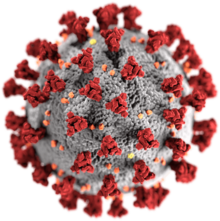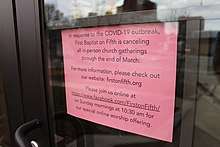Social impact of the COVID-19 pandemic
The COVID-19 pandemic has had far-reaching consequences beyond the spread of the disease itself and efforts to quarantine it, including political, cultural, and social implications.
| Part of a series on the |
| COVID-19 pandemic |
|---|
 |
|
|
|
International response |
|
Medical response |
|
|
|
Political impacts
A number of provincial-level administrators of the Communist Party of China (CPC) were dismissed over their handling of the quarantine efforts in Central China, a sign of discontent with the political establishment's response to the outbreak in those regions. Some experts believe this is likely in a move to protect Communist Party general secretary Xi Jinping from people's anger over the coronavirus pandemic.[1] Some commentators have suggested that outcry over the disease could be a rare protest against the CPC.[2] Additionally, protests in the special administrative region of Hong Kong have strengthened due to fears of immigration from mainland China.[3] Taiwan has also voiced concern over being included in any travel ban involving the People's Republic of China (PRC) due to the "one-China policy" and its disputed political status.[4] Further afield, the treasurer of Australia was unable to keep a pledge to maintain a fiscal surplus due to the effect of the coronavirus on the economy.[5] A number of countries have been using the outbreak to show their support to China, such as when Prime Minister Hun Sen of Cambodia made a special visit to China with an aim to showcase Cambodia's support to China in fighting the outbreak of the epidemic.[6]
The United States president Donald Trump was criticised for his response to the pandemic.[7][8][9] He was accused of making several misleading or false claims, of failing to provide adequate information, and of downplaying the pandemic's significance.[10] Trump was also criticised for having closed down the global health security unit of the United States National Security Council, which was founded to prepare the government for potential pandemics.[11]
The Government of the Islamic Republic of Iran has been heavily affected by the virus, with at least two dozen members (approximately 10%) of the Iranian legislature being infected, as well as at least 15 other current or former top government officials, including the vice-president.[12][13] Advisers to Ali Khamenei and Mohammad Javad Zarif have died from the disease.[14] The spread of the virus has raised questions about the future survival of the regime.[15]
Impact on sovereignty
Geoeconomics and country risk-experts have emphasized the potential erosion of political and economic sovereignty that may affect some already-enfeebled countries like Italy: Edward Luttwak has called Covid-19 "the virus of truth".[16] M. Nicolas Firzli, director of the World Pensions Council (WPC) and advisory-board member at the World Bank Global Infrastructure Facility (GIF), refers to the pandemic as "the Greater Financial Crisis", that will "bring to the surface pent-up financial and geopolitical dysfunctions ... [many] national economies will suffer as a result, and their political sovereignty itself may be severely eroded".[17]
Civil rights and democracy
Iran, Jordan, Morocco, Oman, and Yemen banned the printing and distribution of newspapers.[18] On 30 March, the parliament of Hungary granted Prime Minister Viktor Orban the power to rule by decree for an indefinite period.
Educational impact

The pandemic has affected educational systems worldwide, leading to the widespread closures of schools and universities. According to data released by UNESCO on 25 March, school and university closures due to COVID-19 were implemented nationwide in 165 countries. Including localized closures, this affects over 1.5 billion students worldwide, accounting for 87% of enrolled learners.[19]
Coronavirus and inequality
Low income individuals are more likely to contract the coronavirus and to die from it.[20] In both New York City and Barcelona, low income neighborhoods are disproportionately hit by coronavirus cases. Hypotheses for why this is the case include that poorer families are more likely to live in crowded housing and work in the low skill jobs, such as supermarkets and elder care, which are deemed essential during the crisis.[21][22] In the United States, millions of low-income people may lack access to health care due to being uninsured or underinsured.[23] Many low income workers in service jobs have become unemployed.[24]
Religious impact

The pandemic has impacted religion in various ways, including the cancellation of the worship services of various faiths, the closure of Sunday Schools, as well as the cancellation of pilgrimages surrounding observances and festivals.[25] Many churches, synagogues, mosques, and temples have offered worship through livestream amidst the pandemic.[26] Relief wings of religious organisations have dispatched medical supplies and other aid to affected areas.[27] Adherents of many religions have gathered together to pray for an end to the pandemic, for those affected by it, as well as for the God they believe in to give physicians and scientists the wisdom to combat the disease;[28][29][30] in the United States, Trump designated 15 March 2020 as a National Day of Prayer for "God’s healing hand to be placed on the people of our Nation".[31][32]
Psychological impact
On 18 March 2020, the World Health Organization issued a report related to mental health and psychosocial issues by addressing instructions and some social considerations during the COVID-19 outbreak.[33]
Due to doubts if pets or other livestock may pass on coronavirus to humans,[34] many people were reluctant to keep their pets fearing transmission, for instance in the Arab World, celebrities were urging people to keep and protect their pets.[35] Meanwhile, people in the U.K. tended to acquire more pets during the coronavirus lockdown.[36]
Suicide
The coronavirus pandemic has been followed by a concern for a potential spike in suicides, exacerbated by social isolation due to quarantine and social-distancing guidelines, fear, and unemployment and financial factors.[37][38]
Risk perception
Chaos and the negative effects of the COVID-19 pandemic may have made a catastrophic future seem less remote and action to prevent it more necessary. However, it may also have the opposite effect by having minds focus on the more immediate threat of the pandemic rather than the climate crisis or the prevention of other disasters.[39]
Personal gatherings
The impact on personal gatherings has been strong as medical experts have advised, and local authorities often mandated stay-at-home orders to prevents gatherings of any size, not just the larger events that were initially restricted. Such gatherings may be replaced by teleconferencing, or in some cases with unconventional attempts to maintain social distancing with activities such as a balcony sing-along for a concert,[40] or a "birthday parade" for a birthday party.[41] Replacements for gatherings have been seen as significant to mental health during the crisis.[42]
Domestic violence
Many countries have reported an increase in domestic violence and intimate partner violence attributed to lockdowns amid the COVID-19 pandemic.[43] Financial insecurity, stress, and uncertainty have lead to increased aggression at home, with abusers able to control large amounts of their victims' daily life. United Nations Secretary-General António Guterres has called for a domestic violence "ceasefire".[45]
Elderly care
Older people are particularly affected by COVID-19. They need special attention during the COVID-19 crisis, and their voices, opinions and concerns are important in formulating responses.[46]
Global data are extremely uncertain at present, nonetheless, the heightened risks of COVID-19 for older persons are evident in all national data. The scale of testing and nature of reporting vary between governments and hence there is risk of misinformation by generalizing from the experience and reports of a given country.[46]
While the number of older persons is relatively and absolutely smaller in developing countries, particularly in Africa, this coincides with other serious structural risks. Countries with the fewest older persons (such as many of the least developed countries), have the fewest health resources, limited experience caring for older patients (including few geriatric specialists), less institutional care for older persons, and far fewer public or NGO support structures for outreach, screening and community-based care of older persons.[46]
Older persons living in long-term care facilities, such as nursing homes and rehabilitation centers, are particularly vulnerable to infection and adverse outcomes from COVID-19. Older persons who live alone may face barriers to obtaining accurate information, food, medication, and other essential supplies during quarantine conditions and community outreach is required. Older persons, especially in isolation, those with cognitive decline, and those who are highly care-dependent, need a continuum of practical and emotional support through informal networks (families), health workers, caregivers, and volunteers.[46]
See also
- COVID-19 pandemic-related shortages
- Distance learning
References
- Bostock, Bill (13 February 2020). "China sacked a brace of top officials in Hubei province, likely in a move to protect Xi Jinping from people's anger over the coronavirus pandemic". Business Insider. Archived from the original on 18 February 2020. Retrieved 26 February 2020.
- Yu, Sun (9 February 2020). "Coronavirus death toll tops Sars as public backlash grows". Financial Times. Archived from the original on 26 February 2020. Retrieved 26 February 2020.
- "Hong Kong protesters torch planned Wuhan virus quarantine building". CNA. Archived from the original on 6 February 2020. Retrieved 26 February 2020.
- "Taiwan hits out at China virus travel bans". medicalxpress.com. Archived from the original on 26 February 2020. Retrieved 26 February 2020.
- Vercoe, Peter. "Australia Walks Back Surplus Promise on Deadly Virus, Wildfires". Bloomberg L.P. Archived from the original on 2 February 2020. Retrieved 14 March 2020.
- Tiezzi, Shannon (6 February 2020). "China and Cambodia: Love in the Time of Coronavirus". Archived from the original on 6 February 2020. Retrieved 10 February 2020.
- Smith, David (14 March 2020). "'I don't take responsibility': Trump shakes hands and spreads blame over coronavirus". The Guardian. ISSN 0261-3077. Archived from the original on 14 March 2020. Retrieved 15 March 2020.
- "Fact Check Friday: Trump's coronavirus response plagued with misstatements". ABC News. Archived from the original on 14 March 2020. Retrieved 15 March 2020.
- Collinson, Stephen. "Trump address sparks chaos as coronavirus crisis deepens". CNN. Archived from the original on 14 March 2020. Retrieved 15 March 2020.
- Burns, Katelyn (13 March 2020). "Trump's 7 worst statements on the coronavirus pandemic". Vox. Archived from the original on 14 March 2020. Retrieved 15 March 2020.
- "Trump struggles to explain why he disbanded his global health team". MSNBC.com. Archived from the original on 15 March 2020. Retrieved 15 March 2020.
- Cunningham, Erin; Bennett, Dalton. "Coronavirus pummels Iran leadership as data show spread is far worse than reported". Washington Post. Archived from the original on 14 March 2020. Retrieved 15 March 2020.
- "Iran Says 10 Percent of Iranian Lawmakers Infected With Coronavirus". National Review. 3 March 2020. Archived from the original on 13 March 2020. Retrieved 15 March 2020.
- Agencies. "Iran: 124 dead from virus including FM's adviser, could use force to stop travel". www.timesofisrael.com. Archived from the original on 18 March 2020. Retrieved 15 March 2020.
- "Will Iran's Regime Survive Coronavirus?". National Review. 12 March 2020. Archived from the original on 14 March 2020. Retrieved 15 March 2020.
- Interview with La7 TV aired on 10 March 2020
- "ECR Risk Experts Contemplate another Financial Crisis", Euromoney, March 20 2020 - Jeremy Weltman.
- "Iran bans printing of all newspapers, citing spread of coronavirus". cpj.org.
- "COVID-19 Educational Disruption and Response". UNESCO. 4 March 2020. Retrieved 29 March 2020.
- Fisher, Max; Bubola, Emma (15 March 2020). "As Coronavirus Deepens Inequality, Inequality Worsens Its Spread". The New York Times. Retrieved 2 April 2020.
- Buchanan, Larry; Patel, Jugal K.; Rosenthal, Brian M.; Singhvi, Anjali (1 April 2020). "A Month of Coronavirus in New York City: See the Hardest-Hit Areas". The New York Times. Retrieved 2 April 2020.
- Madrid, Stephen Burgen Sam Jones in (1 April 2020). "Poor and vulnerable hardest hit by pandemic in Spain". The Guardian. Retrieved 1 April 2020.
- "Coronavirus May Disproportionately Hurt the Poor—And That's Bad for Everyone". Time. Retrieved 2 April 2020.
- Thompson, Derek (20 March 2020). "The Coronavirus Will Be a Catastrophe for the Poor". The Atlantic. Retrieved 2 April 2020.
- Burke, Daniel (14 March 2020). "What churches, mosques and temples are doing to fight the spread of coronavirus". CNN. Archived from the original on 14 March 2020. Retrieved 16 March 2020.
- Parke, Caleb (13 March 2020). "Churches cancel Sunday service, move online amid coronavirus pandemic". Fox News. Archived from the original on 15 March 2020. Retrieved 16 March 2020.
- "Coronavirus Disease 2019 (COVID-19)". Evangelical Lutheran Church in America. 2019. Archived from the original on 18 March 2020. Retrieved 17 March 2020.
- Sheva, Arutz (15 February 2020). "Thousands to pray at Western Wall for end to COVID-19 epidemic". Israel National News. Archived from the original on 18 March 2020. Retrieved 17 March 2020.
- Solovy, Alden (27 February 2020). "Coronavirus: A Prayer for Medical Scientists". Union for Reform Judaism. Archived from the original on 18 March 2020. Retrieved 17 March 2020.
- Trump, Donald (14 March 2020). "Proclamation on the National Day of Prayer for all Americans Affected by the Coronavirus Pandemic and for our National Response Efforts". The White House. Archived from the original on 17 March 2020. Retrieved 17 March 2020.
- Casiano, Louis (13 March 2020). "Trump declares Sunday a National Day of Prayer amid coronavirus crisis". Fox News. Archived from the original on 18 March 2020. Retrieved 17 March 2020.
- Parke, Caleb (16 March 2020). "Trump, millions go to church online on National Day of Prayer amid coronavirus". Fox News. Archived from the original on 17 March 2020. Retrieved 17 March 2020.
- "Mental health and psychosocial considerations during the COVID-19 outbreak" (PDF). World Health Organization. 18 March 2020.
- "Coronavirus Disease 2019 (COVID-19): If You Have Animals". cdc.gov. 11 February 2020.
- فنانون عرب في رسالة لمتابعيهم: الحيوانات الأليفة لا تنقل فيروس كورونا. arabic.cnn.com (in Arabic). 31 March 2020.
- "UK coronavirus lockdown: the new rules, and what they mean for daily life". Telegraph. 3 April 2020.
- Gunnell, David; et al. (21 April 2020). "Suicide risk and prevention during the COVID-19 pandemic". The Lancet. Retrieved 27 April 2020.
- Baker, Noel (22 April 2020). "Warning Covid-19 could lead to spike in suicide rates". Irish Examiner. Retrieved 27 April 2020.
- "The Guardian view on Brazil and the Amazon: don't look away | Editorial". The Guardian. 5 June 2020. Retrieved 9 June 2020.
- Hassan, Jennifer. "During quarantine, balconies worldwide set the stage for DJ sets, squats and singing". Washington Post. Retrieved 29 March 2020.
- Ryan, Shannon. "How do you celebrate a kid's birthday during the stay-at-home order? Try a Coronavirus Caravan, with drive-by signs and songs and smiles". chicagotribune.com. Retrieved 29 March 2020.
- JaniakMarch 21, Lily; March 23, 2020Updated; 2020; Am, 8:56. "Bay Area neighbors sing and dance in social-distancing block party". Datebook | San Francisco Arts & Entertainment Guide. Retrieved 29 March 2020.CS1 maint: numeric names: authors list (link)
- Godbole T (9 April 2020). "Domestic violence rises amid coronavirus lockdowns in Asia". Deutsche Welle (DW). Retrieved 11 April 2020.
- "UN chief calls for domestic violence 'ceasefire' amid 'horrifying global surge'". UN News. 5 April 2020. Retrieved 11 April 2020.
- "Implications of COVID-19 for Older Persons: Responding to the Pandemic". UNFPA. 24 April 2020. Retrieved 5 June 2020.